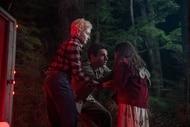This "True Story" 2002 Movie From Steven Spielberg Was Apparently a Not-So-True Story
In Steven Spielberg’s hands, does it really matter how much of Frank Abagnale Jr.’s real-life crime story is real?

We’ll likely never know the extent to which the real-life fraudster who inspired Steven Spielberg’s Catch Me If You Can (streaming here on Peacock) told the actual truth about his amazing games of professional deceit. But then again, does it even really matter? As lighthearted thrillers go, it makes for one hell of a story either way.
A 2002 fusion of A-list acting names and Spielberg at the height of his most clever directorial run (believe it or not, Spielberg’s elegantly mind-bending Minority Report starring Tom Cruise released in the very same year), Catch Me If You Can is based on the same-named autobiography of Frank Abagnale Jr., a reformed ex-con who did hard time in three different countries for almost getting away with the kind of fraud you’re only supposed to see in the movies.
The truth that matters in Steven Spielberg's Catch Me If You Can
Leonardo DiCaprio assumes Abagnale’s role (and keeps his real name) as the shapeshifting con man at the center of the movie, pursued by fictional FBI Agent Carl Hanratty (Tom Hanks) with a relentless diligence that’s fueled by an equal mix of duty to the law and totally understandable personal fascination. After all, what weird quirk of character makes a guy think he can convince airlines, attorneys, academics, and physicians that he’s a pedigreed colleague of theirs in each of their respective fields? And perhaps more intriguingly, what gives him the audacity to actually fly the plane; to weigh the case; to treat the patient — and to pull it all off, for years on end, with (almost) no questions asked?
Abagnale’s version of his own life’s story has gotten plenty of revisionist scrutiny since Catch Me If You Can’s release — enough to compel him to confess — as he did in a 2015 interview — that Spielberg’s big-screen version is “about 80% accurate” when it comes to living up to Abagnale's claims.
But the unique bond that Abagnale eventually forged with his actual FBI pursuer in the movie is real enough, even if Hanks’ character is only a stand-in. “Oh, yes, his real name is Joseph Shea, and we’ve remained in touch over the years, and he’s gotten to see me turn my life around and watch my children grow up,” shared Abagnale, who after serving in prison went on to begin consulting with the agency that once chased him.
There’s an incredible scene near the movie’s end where it’s clear that whatever’s driving Frank to keep living his life as one big series of souped-up disguises is destined to catch up with him — even if he does dodge the feds. Wearing a pilot’s uniform and hastily stalking toward his next criminal act (flying a commercial jet with fraudulent credentials), Hanratty catches up with Frank alone. “Sometimes it’s easier living the lie,” Hanks’ character tells the compulsive phony, knowing full well that Frank’s attachment to his fake identities comes from a deep place within his psyche that not even Frank himself can explain.
“Look,” the fed says, gesturing toward an empty airport tunnel — one where Hanratty, after years and years of these cat-and-mouse games — is the only G-man in sight. “Frank — nobody’s chasing you.” It’s a quiet, conversational, and perfectly Spielbergian insight that frames the insane chase story of Catch Me If You Can in terms that transcend the action, and it’s what places the movie leagues beyond your everyday, ordinary crime thriller.
Stream Catch Me If You Can on Peacock here.
























